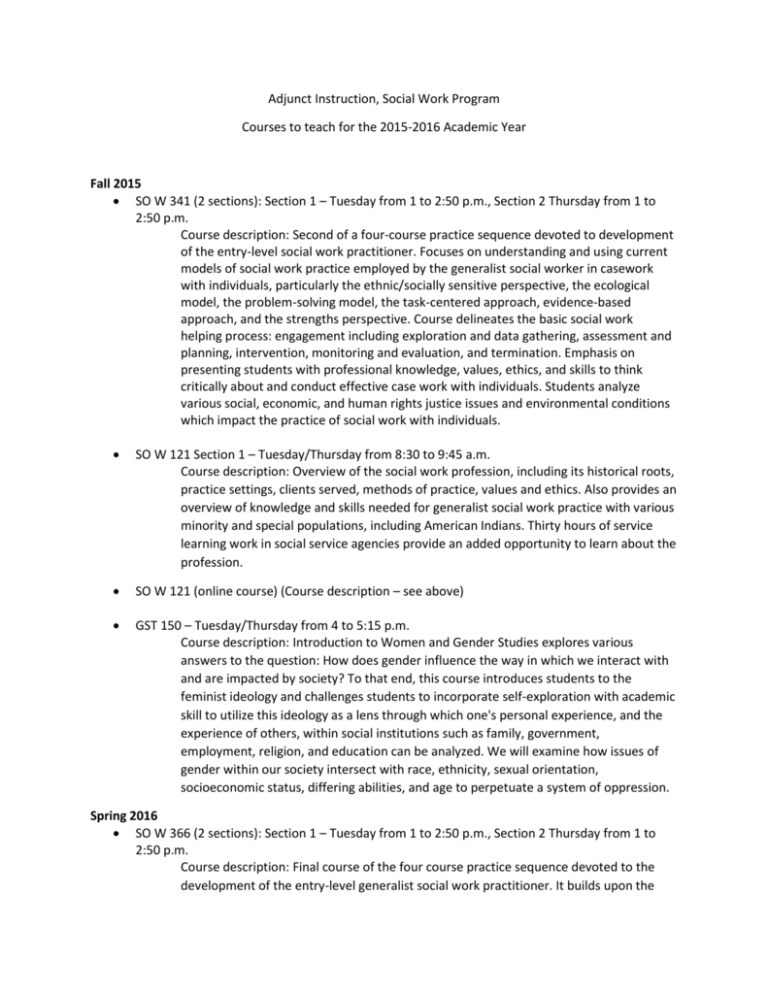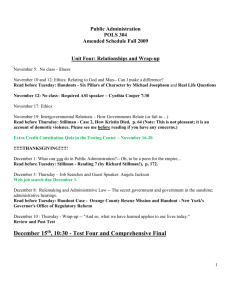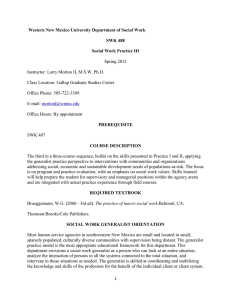Adjunct Instruction, Social Work Program Courses to teach for the
advertisement

Adjunct Instruction, Social Work Program Courses to teach for the 2015-2016 Academic Year Fall 2015 SO W 341 (2 sections): Section 1 – Tuesday from 1 to 2:50 p.m., Section 2 Thursday from 1 to 2:50 p.m. Course description: Second of a four-course practice sequence devoted to development of the entry-level social work practitioner. Focuses on understanding and using current models of social work practice employed by the generalist social worker in casework with individuals, particularly the ethnic/socially sensitive perspective, the ecological model, the problem-solving model, the task-centered approach, evidence-based approach, and the strengths perspective. Course delineates the basic social work helping process: engagement including exploration and data gathering, assessment and planning, intervention, monitoring and evaluation, and termination. Emphasis on presenting students with professional knowledge, values, ethics, and skills to think critically about and conduct effective case work with individuals. Students analyze various social, economic, and human rights justice issues and environmental conditions which impact the practice of social work with individuals. SO W 121 Section 1 – Tuesday/Thursday from 8:30 to 9:45 a.m. Course description: Overview of the social work profession, including its historical roots, practice settings, clients served, methods of practice, values and ethics. Also provides an overview of knowledge and skills needed for generalist social work practice with various minority and special populations, including American Indians. Thirty hours of service learning work in social service agencies provide an added opportunity to learn about the profession. SO W 121 (online course) (Course description – see above) GST 150 – Tuesday/Thursday from 4 to 5:15 p.m. Course description: Introduction to Women and Gender Studies explores various answers to the question: How does gender influence the way in which we interact with and are impacted by society? To that end, this course introduces students to the feminist ideology and challenges students to incorporate self-exploration with academic skill to utilize this ideology as a lens through which one's personal experience, and the experience of others, within social institutions such as family, government, employment, religion, and education can be analyzed. We will examine how issues of gender within our society intersect with race, ethnicity, sexual orientation, socioeconomic status, differing abilities, and age to perpetuate a system of oppression. Spring 2016 SO W 366 (2 sections): Section 1 – Tuesday from 1 to 2:50 p.m., Section 2 Thursday from 1 to 2:50 p.m. Course description: Final course of the four course practice sequence devoted to the development of the entry-level generalist social work practitioner. It builds upon the basic framework of social work casework practice, theory, helping process and skills examined in SO W 340 (Methods I), 341 (Methods II), and 344 (HBSE I). Primary emphasis on macro practice at the agency and community levels, including working effectively at the local, state, national and global levels. Focuses on the values and ethics, knowledge and skills needed for practice within agency and community settings. Includes content on 1) conscious use of self in macro levels of practice, 2) resolution of ethical dilemmas encountered in macro practice situations, 3) organizational planning, administration and supervision, and 4) uses of community organizing, development, advocacy and policy making. Students develop assessment, planning, intervention, and evaluation skills at the macro level. SO W 121 Section 1 – Tuesday/Thursday from 8:30 to 9:45 a.m. (Course description – see above) GST 150 Section 1 – Time to be determined (Course description – see above) SO W 380 (2 sections) - Section 1 – Thursday from 3 to 4:50 p.m., Section 2 Tuesday from 3 to 4:50 p.m. Course description: First of a two-course sequence, introducing basic concepts and approaches of social science research. Specific focus on the empowering communityand agency-based approaches often employed by social work researchers, emphasis on understanding the research process, including conceptualization, planning, data collection, data analysis, and research writing. Express attention given to ethical and diversity issues often encountered in social work research.



